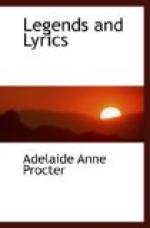Yet why blame her? it had needed greater strength
than she was given
To have gone against the current that so calmly flowed
along;
Nothing fresh came near the village save the rain
and dew of heaven,
And her nature was too passive, and her love perhaps
too strong.
The great world of thought, that rushes down the years,
and onward sweeping
Bears upon its mighty billows in its progress each
and all,
Flowed so far away, its murmur did not rouse them
from their sleeping;
Life and Time and Truth were speaking, but they did
not hear their call.
Years flowed on; and every morning heard her prayer
grow lower, deeper,
As she called all blessings on him, and bade every
ill depart,
And each night when the cold moonlight shone upon
that quiet sleeper,
It would show her ring that glittered with each throbbing
of her heart.
Years passed on. Fame came for Philip in a full,
o’erflowing measure;
He was spoken of and honoured through the breadth
of many lands,
And he wrote it all to Mildred, as if praise were
only pleasure,
As if fame were only honour, when he laid them in
her hands.
Mildred heard it without wonder, as a sure result
expected,
For how could it fail, since merit and renown go side
by side:
And the neighbours who first fancied genius ought
to be suspected,
Might at last give up their caution, and could own
him now with pride.
Years flowed on. These empty honours led to
others they called better,
He had saved some slender fortune, and might claim
his bride at last:
Mildred, grown so used to waiting, felt half startled
by the letter
That now made her future certain, and would consecrate
her past.
And he came: grown sterner, older—changed
indeed: a grave reliance
Had replaced his eager manner, and the quick short
speech of old:
He had gone forth with a spirit half of hope and half
defiance;
He returned with proud assurance half disdainful and
half cold.
Yet his old self seemed returning while he stood sometimes,
and listened
To her calm soft voice, relating all the thoughts
of these long years;
And if Mildred’s heart was heavy, and at times
her blue eyes glistened,
Still in thought she would not whisper aught of sorrow
or of fears.
Autumn with its golden corn-fields, autumn with its storms and showers, Had been there to greet his coming with its forests gold and brown; And the last leaves still were falling, fading still the year’s last flowers, When he left the quiet village, and took back his bride to town.
Home—the home that she had pictured many
a time in twilight, dwelling
On that tender gentle fancy, folded round with loving
care;
Here was home—the end, the haven; and what
spirit voice seemed telling,
That she only held the casket, with the gem no longer
there?
Sad it may be to be longing, with a patience faint
and weary,
For a hope deferred—and sadder still to
see it fade and fall;
Yet to grasp the thing we long for, and, with sorrow
sick and dreary,
Then to find how it can fail us, is the saddest pain
of all.




